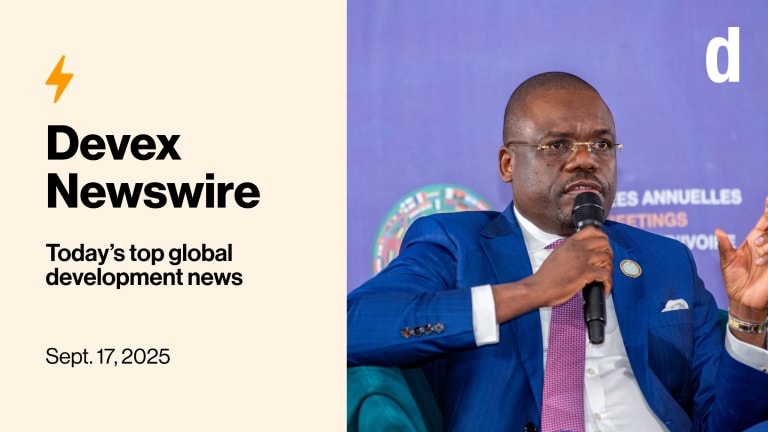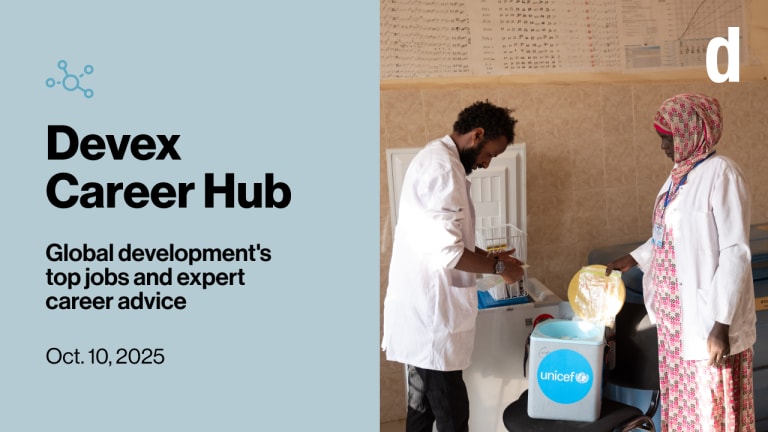
In Pakistan's coal mines, onsite tuberculosis screenings using portable X-rays and AI are changing detection and treatment for vulnerable communities. And the solutions discovered can apply to more than just TB.
Also in today’s edition: What the big earners earn, and newly released U.K. government papers reveal Bob Geldof’s dismissive views of African leaders two decades ago.
This is a preview of Newswire
Sign up to this newsletter for an inside look at the biggest stories in global development, in your inbox daily.
+ Want to get up to speed on what to expect in development in 2025? Join us for our first Devex Pro event of the year, an ask-me-anything discussion with our President and Editor-in-Chief Raj Kumar on Jan. 8, and get a unique perspective to aid your readiness.
Not yet a Pro member? Start your 15-day free trial today to access all our exclusive events and content!
Buried hope
Deep in Pakistan's Salt Range, coal miners chip away in dim, sweltering tunnels where temperatures can soar to 140 degrees Fahrenheit (60 degrees Celsius). It’s a life fraught with danger — mine collapses, toxic gases, and coal dust. It’s also the perfect breeding ground for tuberculosis, the world’s deadliest infectious disease.
These miners often suffer from silicosis, a lung disease that worsens their TB risk. Yet, seeking treatment isn’t simple — long treks to clinics mean lost wages, and fear of losing their jobs keeps many silent. Enter the Dopasi Foundation, a nonprofit tackling these barriers head-on with free TB screenings right at worksites, armed with ultra-portable X-ray machines and cutting-edge AI.
Teaming up with the Stop TB Partnership's TB REACH initiative, Dopasi has revolutionized TB detection, slashing diagnosis times and bringing lifesaving care to coal miners and other vulnerable groups, including brick kiln workers, prisoners, and refugees. The initiative’s active case-finding strategy goes where patients are instead of waiting for them to come.
Miners like Tariq Irfan, who once dreaded his persistent cough, now find a lifeline in these camps. Diagnosed through Dopasi’s mobile units, Tariq was assured job security and given paid leave for treatment. Meanwhile, families of TB patients receive preventative care, and Dopasi’s AI tools are being used globally, setting new standards in TB screening, writes Devex Senior Reporter Sara Jerving in her compelling visual report that takes us inside the mines.
Beyond coal mines, Dopasi’s work ripples outward. Mobile clinics and health camps tackle not just TB but hepatitis C and mental health issues. The innovative efforts have influenced global TB guidelines, proving that creative solutions can break barriers.
Sometimes, the light at the end of the tunnel is more than just sunlight — it’s a path to survival.
Explore the visual story: Finding the hard-to-reach TB patients in Pakistan
+ For more content like this, sign up to Devex CheckUp — our free, weekly newsletter that keeps you up to date with all the must-read global health coverage.
Triple-digit paychecks
I’m in a numbers kind of mood, so this next story deals with the numbers we’re all desperate to know when applying for jobs: salaries — especially before we’re asked the dreaded question of what our own salary expectations are.
As always, our careers team has your back. While in many respects 2024 was a tough year for the job market, there were still plenty of lucrative jobs. Advertised salaries on the Devex job board — the world’s largest collection of global development job opportunities — reached as high as $750,000, underscoring the strong demand for leaders in fields such as public health, finance, and digital transformation.
In fact, across the top 20 positions, salary ranges averaged between $331,625 and $418,183, writes my colleague Raquel Alcega. The best-paid roles on the Devex job board last year were advertised by 16 organizations that disclosed their salary ranges, offering invaluable insights for job seekers. Here’s a snippet:
• Chief Executive Officer, Vital Strategies.
Annual salary range: $500,000 - $600,000.
Location: New York, USA.
Vital Strategies advertised for a new CEO to lead the organization into its next chapter following the appointment of its founding leader, José Luis Castro, as the World Health Organization’s special envoy for chronic respiratory diseases. The organization, known for its $100 million portfolio and programs in 80 countries, was hiring a visionary leader to expand its global health impact and build on its legacy of transformative growth.
• Head of HIV Drugs, Gates Foundation.
Annual salary range: $322,000 - $543,600.
Location: Seattle, USA.
The Gates Foundation created a new position to lead innovative strategies for developing and delivering long-acting antiretrovirals for HIV prevention and treatment. The role focused on advancing partnerships with academia, industry, and nonprofits to bring cutting-edge solutions like long-acting injectable and implantable antiretrovirals to high-burden countries.
Want to read the rest? Access the full report by signing up for a 15-day free trial of a Devex Career Account and get the lowdown on job offerings and salaries. You’ll also gain access to all our exclusive career advice and resources and the full global development job board.
Download the report here: The 20 best-paid global development job opportunities in 2024 (Career)
Global voices
To kick-start 2025, we have a series of predictions for development curated by our Opinions Editor Honesty Pern.
This collection of op-eds authored by a range of thought leaders seeks to answer the question: “What is one approach, trend, or innovation that could significantly impact global development in 2025?”
• On the Trump effect on global health and development for 2025: “Change is coming. If organizations don’t appreciate that and get ahead of it, they could end up underneath it.” — Peter A. Singer, professor emeritus, University of Toronto
• On gender equality: “If there’s one thing that can transform global development in 2025, it’s our ability to dream bigger.” — Phumzile Mlambo-Ngcuka, board chair, Women Deliver
• On a potential African pivot to sustainable agriculture: “Africa stands on the cusp of a transformative era, with several robust frameworks poised to reshape its food systems.” — Agnes Kalibata, president of AGRA
• On collaboration: “At its core, collaborative development recognizes that no single entity has all the answers.” — Jeroo Billimoria, founder of the One Family Foundation
Read on for the full set of predictions for global development in 2025.
+ Want to write an opinion article for Devex? Email us your pitch at editor@devex.com.
Geldof his lawn
Bob Geldof spent much of the festive period batting away criticism that the 40th anniversary re-release of his charity record “Do They Know It’s Christmas?” was degrading to modern-day Africa, insisting, “this little pop song has kept millions of people alive.”
Now the New Year release of United Kingdom government papers from 20 years ago show the Band Aid founder was far from complimentary about the continent’s leaders as he sought to influence Tony Blair’s attempts to fire up development aid, our U.K. reporter Rob Merrick tells me.
The then-prime minister’s 2005 Commission for Africa created a blueprint for action on aid, trade, and debt relief at the landmark Group of Eight advanced economies’ summit in the U.K. that year, after — it now emerges — a behind-the-scenes tussle over who should be in charge.
A memo to Blair, penned by his international development adviser Liz Lloyd, says of Geldof: “He is scathing about the ability and worthiness of virtually all African leaders and sees the audience as primarily the US,” adding, “he therefore does not want an African co-chair, content to ride with your name to give it credibility.”
Blair did chair the commission, but the majority of its 17 figures from the worlds of government, business, and development were African.
+ Missed out on the top globaldev stories that dominated headlines over the holidays? We’ve got you covered with the latest episode of our weekly podcast. Sara joins our Managing Editor Anna Gawel and Global Reporter Elissa Miolene to discuss the legacy of former U.S. President Jimmy Carter, the plan for an Africa-led HIV response, among other news.
In other news
At least 27 African migrants have perished off Tunisia's coast after their vessels capsized while attempting to cross the Mediterranean Sea, according to Tunisia's national guard. [Reuters]
Post-election violence in Mozambique has displaced thousands and disrupted aid efforts for cyclone victims, the United Nations refugee agency warned. [UN News]
Saudi Arabia launched an aid airlift to Syria on Wednesday, with the first flight departing Riyadh carrying food, medical supplies, and shelter materials, state media reported. [Al Arabiya]
Sign up to Newswire for an inside look at the biggest stories in global development.








